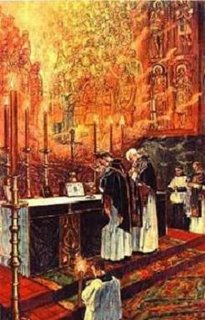Frequently Asked Questions on the Eucharist (FAQ)
First Holy Communion at a Parish in France (March 1952)
Q: What is Holy Communion?
A: Also known as the Eucharist, Holy Communion is the center of the Catholic faith because it is truly the Body, Blood, Soul, and Divinity of Our Lord Jesus Christ. It is not in any way a symbol but literally Christ’s most Holy body. The bread and wine at the Mass become the holiest of holies through the priest’s words by the power of God. The moment when the Bread and Wine become Jesus Christ is called transubstantiation. The entire Gospel of John Chapter Six even wrote specifically on the Eucharist and how Christ’s body is truly present.
Some people that don't believe in the Eucharist say that Jesus meant for it to be symbolic. Well, then we look to the Gospel of John Chapter 6. That chapter is entirely on the Eucharist, and we see that when Our Lord tells them "Unless you eat my Body and Drink my Blood you will have no life within you" the people do one thing: they leave Him. If Jesus was speaking symbolically He would have said "No, you misunderstand" like He did before in the Gospels, but this time He just let them walk away. Thousands left Him, but He let them because what He spoke was literally true and they couldn't accept it. “Since Christ Himself has said, ‘This is My Body’ who shall dare to doubt that it is His Body? (Saint Cyril of Jerusalem)
For more information see:
The Eucharist.
Q: Does the Sacred Host also contain Christ's Blood?
A: Yes, the Consecrated Host also contains the Blood, Soul, and Divinity of Our Lord. The wine also becomes at the Consecration not just Christ s Blood but His Body, Soul, and Divinity also. After the Consecration, the presence of Christ only remain. The consecrated bread may look like bread but no part of its substance is bread. Only the accidents (the mere appearance, taste, smell, etc) of bread remains the same applies to the Consecrated wine - it is not wine.
The breaking of the Body of Christ or the separation of the Blood does not divide Christ, so receiving only a piece of a full Communion Host is still receiving Jesus Christ completely (as affirmed at the Council of Trent: Thirteenth Session: Canon III)
Q: Do the People Also Need to Receive Holy Communion From the Chalice?
For centuries, only the priest alone received the Consecrated Wine from the chalice. The notion in the past few decades that the faithful need to also receive from the chalice is a grave error. The fullness of Christ is received under either species. Traditionally, as is still done of course in the Tridentine Mass, the faithful will only receive the Consecrated Host.
The Baltimore Catechism in Q. 900 advised, "The Church does not give Holy Communion to the people as it does to the priest under the appearance of wine also, to avoid the danger of spilling the Precious Blood; to prevent the irreverence some might show if compelled to drink out of a chalice used by all, and lastly, to refute those who denied that Our Lord's blood is present under the appearance of bread also."
For more information, please see
Holy Communion Under One or Both Species?
Q: What are Eucharistic Miracles?
A: These are outward signs of the majesty of Our Lord’s true presence in the Holy Eucharist. I recognize this mirroring the Transfiguration when Our Lord on Mt. Tabor appeared dazzlingly white with Elijah and Moses. This was an outward manifestation of Our Lord’s immense greatness. The Transfiguration wasn’t in and of itself the greatest part of this mystery, but what is even greater is that Christ humbled Himself and kept in His immense glory while on earth.
Eucharistic miracles are the same where the Lord’s greatness reveals itself and scientific testing has proven it to be true blood and tissue. These miracles are not required beliefs of the Catholic faith, and the Eucharist from these Mass is no less amazing then the Eucharist at other Masses because the Eucharist is always the same true presence of Jesus Christ.
Read about these beautiful miracles.
Q: If I suspect someone is taking the Eucharist from Mass without the intentions of giving it to the sick what should I do?
A: If someone takes Communion back to the pew and doesn’t consume it PLEASE report it to the priest or someone in an authority position at the parish. Sometimes people will take Our Lord’s Body to desecrate it and this destruction of Our Lord in the Eucharist is a grave sacrilege.
We can help prevent this by working to stop Communion in the hand.
Q: Can Holy Communion ever be denied?
A: It can be denied to individuals in a public act of scandal. For example, if one regularly known non-Catholic is at a Mass and wishes to receive Holy Communion it is to be denied. Holy Communion may - and should - be denied to those Catholics who promote intrinsic evils such as abortion, gay marriage, and artificial contraception. Also, if one suspects a person is going to desecrate the Eucharist it can be denied.
Q. Should the Faithful be Forced to Receive Communion in the Hand?
No. Even during health crises, Holy Communion may never be denied on the tongue. No one may force Holy Communion in the Hand.
The Vatican has affirmed this.
Q: Are there special conditions on receiving the Eucharist?
A: Yes. One must be a Catholic in good standing with the Church. You must also obey the Eucharistic fast and not be in a state of mortal sin (
Ecclesia de Eucharistia, 37). Those who have committed a mortal sin must first receive absolution in Confession. Those who fail to do so commit the most grievous sin of sacrilege.
The Catechism of the Council of Trent states, “As of all the sacred mysteries bequeathed to us by our Lord and Savior as most infallible instruments of divine grace, there is none comparable to the most holy Sacrament of the Eucharist; so, for no crime is there a heavier punishment to be feared from God than for the unholy or irreligious use by the faithful of that which contains the author and source of holiness.”
St. Cyril of Alexandria explains further the gravity when he says, “They who make a sacrilegious Communion receive Satan and Jesus Christ into their heart. Satan, that they may let him rule, and Jesus Christ that they may offer Him in sacrifice to Satan.”
That’s a sacrilegious Communion. That’s why it is so grave and evil and truly few sins offend the Lord’s heart as much as this. Indeed, our Lord told St. Bridget in a vision, “There does not exist on earth a punishment great enough to punish it sufficiently.”
Q: How many times a day can we receive communion?
A: In the old 1917 Code of Cannon Law, reception of Holy Communion more than once a day was prohibited. Unfortunately, in another novelty after Vatican II, the 1983 Code was revised to state that Holy Communion can be received twice a day, noting though that the second time must be in a Mass. Traditionally, we receive our Lord only once a day (that is once each calendar day and not necessarily once every 24 hours). Traditional Catholics will still maintain this practice.
As an exception to both the 1917 and the 1983 Canon Law, a person may receive Holy Communion again the same day in the form of the Viaticum, which is the name of the Eucharist when given to one who is extremely ill and seemly near death. Holy Communion is often given to souls during Last Rites, and it would be called Viaticum.
"Christ held Himself in His hands when He gave His Body to His disciples saying: 'This is My Body.' No one partakes of this Flesh before he has adored It" (Saint Augustine).
Q: What act of reverence should we show before receiving Holy Communion?
A: An act of reverence must be made before receiving Holy Communion because it is showing reverence to Our Lord truly present before us. People are also still allowed to receive the Holy Eucharist while kneeling, and as is the traditional practice, Holy Communion
should be received while kneeling.
Q: What is Intinction?
A: Intinction is only allowed to be performed by the ordinary minister of Holy Communion (i.e. the priest). No "lay minister" may do so. Intinction is where the Sacred Host is dipped in the Sacred Blood of Christ. In the Byzantine Rite one receives the Lord without saying “Amen” but the priest puts the Host dipped in the Sacred Blood in the person’s mouth. Those receiving this way always have their head tipped backwards.
This form of receiving Holy Communion is rarely observed in the Roman Catholic Rite because of the risk of dripping the Lord's body and blood on the ground. When observed, the priest has a minister standing at his side holding the consecrated wine and he takes a particle of the consecrated bread and dips it. He then says "The body and blood of Jesus". A paten must be held under the Body and Blood to prevent any from falling to the ground. While uncommon, this form of receiving is permitted in the Roman Catholic Church (i.e. the Latin Rite).
Q: What is the Eucharistic fast and how long is it?
A: The Eucharistic fast is a fast before receiving Holy Communion to observe a period of reflecting and spiritual hunger for Our Lord. Currently, only medicine and water are allowed before hand, but if one needs to eat for serious medical reason this can be circumvented. Note that a priest who celebrates the Eucharist two or three times a day can take something before the second and third Mass even if it is less than one hour before receiving the Blessed Sacrament again. Also, the elderly, ill, and those that care for them may receive the Eucharist if they have eaten something in the previous hour (Canon 919).
Many Traditional Catholics will take part in the traditional fast, which was three hours long. Other Traditional Catholics will take part in an older form of the fast which mandated fasting from midnight until receiving Communion.
For more thorough information see:
What is the Eucharistic Fast?
Q: How often is one required to receive the Eucharist?
A: A Catholic is only required to receive the Eucharist once a year and that is to be done during the Easter season (Canon 920). However, one should receive our Lord more often - even daily - if they are in the state of grace and have the right dispositions so they do not receive our Lord out of mere habit.
When is the Easter Season for the purpose of observing our "Easter Duty"? In the United States it is from the first Sunday of Lent to Trinity Sunday inclusive; in other countries, the season may begin on Ash Wednesday and close on Low Sunday or Ascension Thursday.
















